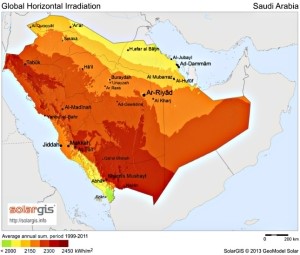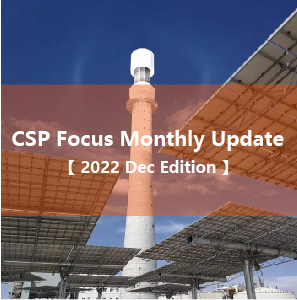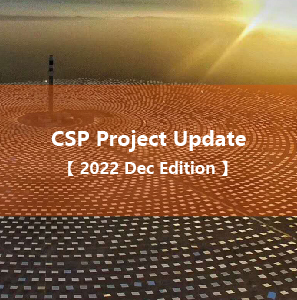Saudi Arabia’s Acwa Power could soon be bidding on Concentrated Solar Power projects
2016.07.05 From: forbesmiddleeast
On May 1, turning the sun’s rays into energy became cheaper than burning coal, oil or natural gas. Bids to build and operate a mega solar power plant for the government of Dubai were stunningly low, with the winning bid of 2.99 cents per kilowatt hour belonging to Masdar, a subsidiary of Abu Dhabi’s investment vehicle Mubadala, and Saudi conglomerate Abdul Lateef Jamil.
Whether Masdar and ALJ can pull it off and turn a profit remains to be seen, but among the heavyweight bidders was a smaller company from Riyadh called ACWA Power. It submitted a bid for just under 4 cents per kilowatt hour.
ACWA Power has been honing its expertise at delivering low cost solar energy projects since 2008. It develops, co-owns, and operates power production and water desalination plants in 12 countries in the Middle East, Africa, and Southeast Asia. In 2014, the latest figures available as of press time, the company reported $142 million in net earnings, a 16% increase over the previous year. Revenues remained flat at $1.7 billion during the same period, which the company attributes to the drop in oil prices.
CEO Paddy Padmanathan calls the company “fuel agnostic,” producing electricity through oil, gas, coal, sun and wind-powered plants attached to utility grids, but it has been steadily ramping up revenues from renewable energy. Currently, 15% of its projects are in renewables. They include a massive complex in Noor-Ouarzazate, Morocco, with 2 gigawatts of capacity, 1 gigawatt in Mohammed bin Rashid Al Maktoum Solar Park in Dubai, scheduled to function in 2017, and the 50 megawatt Bokpoort Concentrated Solar Power plant in Northern Cape Province, South Africa.
Ironic for a Saudi company that has made inroads in renewable energy in different corners of the world, except its own country. But, that may soon change.
This past December, Saudi Arabia agreed—albeit reluctantly, to bring down greenhouse gas emissions caused by fossil fuels. Six months later, the government reconfigured its apparatus to move away its economy from oil, as part of its Vision 2030 plan.
With fuel consumption projected to triple by 2030, the oil-rich nation might be forced to import fuel if it does nothing to expand its resources. Part of the government’s solution is to develop renewable energy, such as solar, wind, and nuclear power. It announced a 9.5 gigawatts renewable energy target by 2030; still modest, but the country currently generates practically zero solar power.
In early June, Saudi Electricity Company asked for bids for two new solar power plants totaling up to 50 megawatts of capacity each, in Al Jouf and Rafha, in the northern part of the country.
Padmanathan says he is “optimistic and eager” about those developments, and plans to bid on the two projects.
While ACWA Power is emerging as a leader in renewable energy, its origins are firmly rooted in Saudi Arabia and oil.
In 2002, when the Saudi government decided to invite the private sector to own and operate electricity and water desalination plants, Mohammad Abunayyan, 53, saw an opportunity to build a business.
At the time, he was chairman of his family’s trading house, an importer of diesel-powered water pumps and machines for agriculture. “Everyone was a Mr. Fix It, but no one really did things,” says Padmanathan. “[Abunayyan] saw a lot of potential value by committing to doing things in Saudi Arabia.”
Abunayyan approached another old family business, Abdul Kadir Al Muhaidib & Sons, which also imported agricultural equipment.
Together, they founded ACWA Power Projects in 2004, raising $1.2 billion in equity and loans to bid on electric and water desalination projects.
Looking for an expert hand to put together bids, Abunayyan approached London-based Padmanathan, who was in charge of business development at Black & Veatch, an American engineering and construction company. The 58-year-old Padmanathan, who has a degree in civil engineering from the University of Manchester, had a reputation for getting things done. He had helped build the first independent power plant in Algeria in 2000, and a sewage system in Ajman, U.A.E. in 2001.
The timing was right. Padmanathan, who hails from Sri Lanka, was looking either to retire or pursue other opportunities as a consultant, after 24 years at Black & Veatch. Following a lunch meeting in London with Abunayyan, he agreed to take on the newly-formed ACWA Power as a client.
Padmanathan remained in London, where he and his wife were raising two children. “I had lived in 10 different countries at that point. I watched CNN, and always congratulated myself on never living in Nigeria or Saudi Arabia,” he jokes.
When Padmanathan looked for partners to put together ACWA Power’s first bid for an electricity and water desalination plant outside Jeddah in 2005, European and American companies showed little interest in co-investing with the Saudi upstart.
Suddenly, Padmanathan felt what it’s like to be on the other side of the fence. He remembered also being dismissive toward smaller players in his days bidding on major electricity, sewage, and construction contracts in emerging markets at Black & Veatch. “You don’t know what you’re doing, so don’t touch anything, but I need you because I don’t know how to get to the airport,” he says, recalling his attitude.
He realized that to attract big partners, he had to show that they had as much to gain as ACWA Power. He approached the sovereign wealth fund and state-owned utility company of Malaysia, which was looking to expand outside its region. The government agreed to partner, and the two formed the Saudi Malaysia Water & Electricity Company, a 50/50 joint venture.
In 2005, it won the contract, worth $2.4 billion, and when its Shuaibah Independent Water and Power Project opened in 2010, it became the first privately-owned power plant in Saudi Arabia. Since 2010, it has delivered desalinated water and electricity to Makkah, Jeddah, Taif, and Al-Baha.
Following that first successful bid, Padmanathan was hooked, and accepted Abunayyan’s offer of CEO and president in 2006. Back then, he had a staff of 16: engineers, former lawyers and bankers who crafted the contracts.
“We pursued everything that came to us,” says Padmanathan. By 2008, he wanted to diversify and pursue power plant projects based on renewable energy, instead of oil and gas. That meant looking outside of Saudi Arabia.
He pulled together a team to start “lobbying with math models” the economic feasibility of a renewable power plant. Their first opportunity to bid on such a project came that year, when the government of Abu Dhabi announced plans to build a 100 megawatt solar plant the size of 285 football pitches. “We practically Googled what Concentrated Solar Power is,” Padmanathan confesses.
ACWA Power lost the bid, coming in second to Abu Dhabi’s Masdar—not a bad first try. The company now had to sharpen those mathematical models. Instead of outsourcing operations and maintenance of plants to a third party, ACWA Power bought a Saudi company in 2012 that would allow it to perform those tasks internally, and help control costs and boost margins.
In 2014, it bid 18.9 cents per kilowatt hour on a solar project called Noor I in Ouarzazate, Morocco, and won. (Two years later, ACWA Power clinched the deal to develop the project’s second phase, with a bid that was 16% lower than the first).
This was followed by another win for an 800 megawatt solar power plant in Dubai, with a price of 5.98 cents per kilowatt hour. ACWA Power partnered with Dubai Electricity and Water Authority, which took a 51% stake in the project; the company picked up 41.6%. The contract was set over 25 years, starting in 2017.
“Everybody said it was crazy, impossible, unachievable,” says Padmanathan. At the time, there were reports that the company planned to go public following the win in Dubai, but Padmanathan denied it. “People thought it was a way of marketing ourselves for an IPO, but it wasn’t.”
ACWA Power had by then 10 shareholders, including the Saudi Public Investment Fund’s Sanabil Direct Investments Company, and the Saudi Public Pension Agency.
The Dubai project came at an opportune time. The price of solar panels had dropped, and because of its track record, ACWA Power was able to get loans on more favorable terms from Saudi banks.

Assaad Razzouk, CEO of Sindicatum Sustainable Resources, a clean energy project developer, explains the economics of a bid: on average, about half of a tariff is based on how much it costs to build a solar park; a tenth is operational costs—Padmanathan refers to those as “if a goat eats a cable” expenses; another tenth goes into insurance and overhead; the remaining third is the cost of capital.
Padmanathan is not sure how Masdar and ALJ were able to bid so low on the Dubai solar project. “It’s like when Roger Bannister broke the four minute mile,” he says, referring to the British Olympic runner. “No one thinks it’s possible until it’s done.” It’s a win for solar energy.
More from CSP Focus
NextSaudi Arabia to become major solar power exporter under new plan
Acwa’s Redstone concentrated solar power project hits cost roadblock in South Africa
ACWA Power, SolarReserve to break ground on 100 MW Concentrated Solar Power plant in South Africa
Price of Concentrated Solar Power to drop to $60/MWh by 2020, IRENA predicts
ACWA Power Prepares to Run 2 Concentrated Solar Power Plants in Moroccan Ouarzazate
Saudi Arabia to tender around 4GW of renewable projects in 2018
Leave your thoughts here
Reports(Member Only)
See more+-
CSP Focus Membership Proposals
We are now proposing CSP Focus Membership, hoping to better serve our members to keep pace with the latest updates of ongoing CSP projects worldwide, and to establish and maintain business relations with major shareholders of the projects. CSP Focus offers to Membership exclusive access to:1. Daily/Weekly update and analysis on CSP policies, projects, technologies, market trend and corporate relea
-
The Latest CSP Focus Monthly Update
Join CSP Focus Membership to Get the Latest CSP Focus Monthly Update December Edition.
-
CSP Project Monthly Update 2022 December Edition
CSP Focus is presenting CSP Project (China) Update 2022 December Edition.Detail report is available for CSP Focus Membership.
-
Presentations-CSP Focus China 2021
The Report is for CSP Focus Members only.
Upcoming Events
See more+-
12th CSP Focus China 2022
2022.04.21-22 Beijing
-
11th CSP Focus China 2021
2021.10.28-29 Beijing
-
10th CSP Focus China 2020
2020.10.22-23 Beijing, China
Project Updates
See more+-
Lanzhou Dacheng Dunhuang CSP Project
Asia Pacific-China,Operational,Parabolic Trough
-
Luneng Haixi 50MW Molten Salt Tower CSP Project
Asia Pacific-China,Operational,Power Tower
-
Dubai 950MW NOOR Energy 1 CSP+PV Project
MENA-UAE,Under construction,Power Tower
-
Power China Gonghe 50MW Molten Salt Tower CSP Project
Asia Pacific-China,Operational,Power Tower





